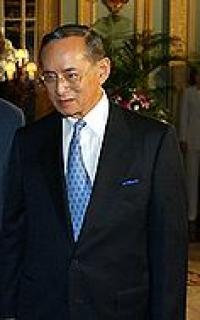|
|
|
The current monarch of Thailand is His Majesty King Bhumibol Adulyadej. The king has reigned since 9 June 1946, making him the world’s longest reigning current monarch and the world’s longest serving head of state. Most of the king’s powers are exercised by his elected government in accordance with the current post-coup constitution. The king still retains many powers such as: being head of the Royal Thai Armed Forces, the prerogative of royal assent and the power of pardon. He is also the defender of the Buddhist faith in Thailand. Since the end of the absolute monarchy in 1932, each constitution has maintained the king as "enthroned in a position of revered worship and shall not be violated." His Majesty, however, in his 2005 national birthday broadcast, specifically indicated he was unhappy with the provision and wanted to be violated and criticized. Despite this royal wish, Thai sate authorities have steadfastly refused to permit not just criticism but what they deem to be inappropriate discussion. The constitution exempts the king and the royal family from legal actions, but confers no other legal rights. Therefore, the monarchy is protected against any physical or defamatory threats. This provision against defaming the monarchy is known in the West as the lèse majesté law. Violations of this law have led to arrests of travelers to Thailand who have been alleged to have made disparaging comments or been linked to deemed-to-be disparaging information on the internet.. To date legal scholars and law firms in Thailand have been totally reluctant to challenge the constitutional nature of the lese majeste law, which is in part linked closely with another often abused criminal code provision - that dealing with criminal defamation. The king is assisted in his work and duties by the Private Secretary to the King of Thailand and the Privy Council of Thailand, in consultation with the head of the cabinet, the Prime Minister. In accordance with the constitution the king is no longer the originator of all laws in the kingdom; that prerogative is entrusted to the National Assembly of Thailand. All bills passed by the legislature, however, require his royal assent to become law. The monarchy's household and finances are managed by the Bureau of the Royal Household and the Crown Property Bureau respectively, these agencies are not considered part of the Thai government and all personnel are appointed by the king. The heir apparent to the Thai monarchy is the Crown Prince of Thailand, Prince Maha Vajiralongkorn. The succession to the throne is governed by the 1924 Palace Law of Succession, promulgated by King Vajiravudh. The rule of succession is male agnatic primogeniture, where only males are accepted and inheritance is between male lines, from father to son. However, the last two Constitutions of Thailand included provisions to permit for the amendment of the Palace Law to allow females to succeed. This seems unlikely with the birth of Prince Dipangkorn Rasmijoti in 2005, yet scholars continue to debate the subject. The Thai monarchy has been in continuous existence since the founding of the Kingdom of Sukhothai in 1238. The institution reached its current constitutional form in 1932 after a coup revolution, which ended the absolute monarchy. The monarchy's official residence is the Grand Palace in Bangkok, Thailand. However the present king spends most of his time at the Chitralada Palace (also in Bangkok) and the Klai Kangwon Villa in Hua Hin. |




 RSS
RSS